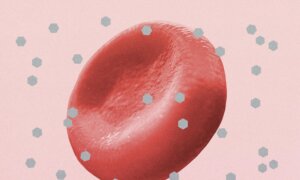A preliminary study has found that stable cholesterol levels are linked to a significantly lower risk of dementia or cognitive decline. Having fluctuating cholesterol levels without a change in medication was associated with a higher risk.
Researchers theorized that changes in cholesterol may destabilize atherosclerotic plaques, resulting in reduced blood flow to the brain.
“Older people with fluctuating cholesterol levels unrelated to whether they were taking lipid-lowering medications—particularly those experiencing big year-to-year variations—may warrant closer monitoring and proactive preventive interventions,” lead author Zhen Zhou, who has a doctorate in epidemiology and is a postdoctoral research fellow in the School of Public Health and Preventive Medicine at Monash University in Melbourne, Australia, said in a press release.
Various lifestyle practices can help people manage their cholesterol levels.
Fluctuating Cholesterol Raised Dementia Risk by 60 Percent
The preliminary research was
presented at the American Heart Association’s Scientific Sessions 2024 on Nov. 16–18. It was a prospective study that followed for six years nearly 10,000 adults in the United States and Australia in their 70s. To determine associations, the researchers used in-trial and post-trial data to evaluate whether low-dose aspirin effectively decreased the risk of heart disease.
Data analysis showed the following:
- High fluctuations in total cholesterol were linked to a 60 percent higher risk of dementia and a 23 percent increased risk of cognitive decline.
- High fluctuations in high-density lipoprotein (HDL), known as “good” cholesterol, and triglycerides were not linked to dementia or cognitive decline. Triglycerides are the body’s most common type of fat, storing excess energy from food.
- Low-density lipoprotein (LDL), or “bad” cholesterol, and total cholesterol fluctuations were linked to a significantly more rapid decline in cognitive test scores and tests measuring reaction speed and memory.
The researchers noted that the study did not include people who started or stopped taking lipid-lowering medications during the investigation, so the results were unrelated to statins, commonly prescribed drugs that reduce cholesterol.
“If future research confirms a cause-and-effect relationship, reducing cholesterol variability could potentially be a promising therapeutic target for dementia,” Zhou added in the press release. “Importantly, our results should not be misinterpreted as suggesting that lowering cholesterol through lifestyle modification or lipid-lowering medications is harmful for brain health.”
Expert Perspectives
The Epoch Times sought reactions to the study from two cardiologists. Their opinions suggest the cardiology community at large may have differing opinions.
General Agreement
Cardiologist and osteopathic doctor Jack Wolfson told The Epoch Times via email that he agreed with the overall findings that fluctuating cholesterol levels are associated with increased dementia risk.
However, he took issue with an important point: the researchers’ suggestion that lipid-lowering medication does not affect dementia risk.
“Although most data suggest otherwise, I think statin drugs lead to dementia and other brain disorders,” he said.
To support his hypothesis, he cited a study published in The Journal of Nuclear Medicine. It found that among people with mild cognitive impairment and low-to-moderate baseline cholesterol levels, the use of a class of medications called lipophilic statins is linked to a doubled risk of dementia.
In contrast, no such clinical or metabolic decline was found for users of other statins. Lipophilic statins tend to dissolve in fats, or lipids, as opposed to the other main category of statins, water-soluble hydrophilic statins.
‘Much Ado About Nothing’
In contrast with Wolfson, Dr. Bradley Bale, a specialist in cardiovascular prevention and co-founder of the BaleDoneen Method, strongly disagreed with the findings.
In an email to The Epoch Times, he cited what he viewed as serious limitations in the study methodology.
“They measured cholesterol annually for 3 years, and then followed people for 6 years for the onset of dementia,” he wrote. “They did not continue to track cholesterol.”
Bale stated that cholesterol levels are constantly changing in response to sleep, diet, and exercise. In addition, serum cholesterol values do not reflect the brain values, as the brain makes its own cholesterol, he continued.
“Therefore, looking for an association of three ‘snapshot’ cholesterol value changes during 3 years with subsequent dementia risk in the next 6 years seems ludicrous,” Bale added. “I think the conclusion of the study is much ado about nothing.”
Possible Explanations for the Findings
If future research validates the findings, several possible underlying explanations include the following.
Reduced or Blocked Blood Flow
“One possible explanation is that significant fluctuations in cholesterol levels may destabilize atherosclerotic plaques, primarily composed of LDL cholesterol,” Zhou told The Epoch Times in an email. “This destabilization can increase the risk of plaque growth, rupture, and subsequent blockages in blood flow to the brain.”
Zhou cited an earlier study published in Circulation that supports this explanation. It found that higher LDL fluctuation unrelated to statin treatment was linked to decreased blood flow and reduced cognitive performance.
Stroke Risk
Dr. Clifford Segil, an osteopathic doctor and neurologist at Providence Saint John’s Health Center in Santa Monica, California, pointed out the link between cholesterol, stroke, and dementia.
“Cholesterol level is a risk factor for cardiovascular disease, including strokes caused by a blood clot,” he told The Epoch Times in an email. “One type of dementia—vascular dementia, or multi-infarct dementia—is caused by recurrent small strokes.”
Zhou said that previous studies have also suggested that cholesterol variation might contribute to cognitive impairment by causing dysfunction in the cells lining the blood vessels, inflammation, and high oxidative stress. These effects underlie the pathological process of dementia development, she said.
Optimal Cholesterol Levels
In cholesterol management, doctors typically aim to lower LDL because it is associated with plaque buildup and blockages and increase HDL because it helps remove cholesterol from arteries.
According to the Centers for Disease Control and Prevention (CDC), optimal levels are as follows:
- Total Cholesterol: about 150 milligrams per deciliter (mg/dL)
- LDL Cholesterol: about 100 mg/dL
- HDL Cholesterol: a minimum of 40 mg/dL in men and a minimum of 50 mg/dL in women
- Triglycerides: less than 150 mg/dL
For most people, lower LDL cholesterol and higher HDL cholesterol are associated with reduced cardiovascular risk, said Zhou.
How to Stabilize Cholesterol
Wolfson summarized cholesterol-stabilizing advice: “The single best strategy to avoid dementia is to eat well, live well, and think well. We call this the 100-Year Heart Method.”
He advocates addressing modifiable risk factors for high cholesterol.
How exactly is this done? The CDC provides the following recommendations:
- Limit foods high in saturated fat, such as fatty meats and palm oil.
- Eat foods low in trans fat, salt, and added sugar.
- Follow a diet that helps manage LDL levels. This includes foods with unsaturated fat, such as avocados and olive oil, and fiber-rich foods like beans and oatmeal.
- Exercise regularly.
- Pursue an optimal weight, as excess weight raises LDL levels.
- Limit alcohol consumption to a maximum of two drinks per day for men and one drink per day for women.
- Avoid smoking.








